2023-24 session outcomes: Workplace/staffing regulations
Restricting employer communication: Lawmakers passed a new law that prohibits employers from meeting or communicating with their employees on public policy. The “captive audience” law stipulates that communications must be “wholly voluntary” and not be political or religious in nature. There is a federal preemption of these laws, and they have been litigated in other states. Minnesota’s law is effective as of August 1, 2023.
Expanding accommodations for pregnant and lactating employees: The Department of Labor and Industry (DLI) will oversee expanded accommodations for pregnant employees including a temporary leave of absence, work schedule or job assignment modifications and more frequent or longer breaks. Lactating employees should now receive specific break times of their choice, lactation spaces, and notice of these accommodations must be given to employees in writing. Businesses with fewer than 15 employees, and in some cases fewer than 21 employees, will be newly subject to these statutes as existing small business exemptions were rescinded. During the 2024 legislative session, provisions were added to require that this leave can't be reduced by any paid or unpaid leave taken for prenatal care medical appointments. While on leave, employers must maintain coverage for the employee and any dependents under any group insurance policy, group subscriber contract, or healthcare plan. This new law and its amendments are already in effect.
Expanding Human Rights Act definitions: Minnesota’s Human Rights Act was updated to include banning salary history questions during the hiring process (effective as of January 1, 2024), including hair in the definition of race (already in effect) and changing definitions of sexual orientation and gender identity (effective as of July 1, 2023). Click here for more information.
Pay transparency: The 2024 legislative session continued its focus on “pay transparency” legislation. Employers with 30 or more employees in Minnesota are now required to include a salary range and a general description of all benefits and other compensation provided in any job posting. Employers are prohibited from leaving salary ranges open-ended within job postings. This policy is effective Jan. 1, 2025.
Minimum wage changes: The 2024 legislative session significantly altered Minnesota’s existing minimum wage structure and increased the minimum wage. For our state’s smallest employers, there will no longer be a designated small business minimum wage, as this rate option was specifically rescinded. Moving forward, there will only be one statewide minimum wage rate for all employers, regardless of size. In addition, the current automatic minimum wage annual inflator adjustment cap of 2.5% was increased to a 5% cap. The state’s large employer rate increased to $10.85 and the small employer rate was $8.85 for 2024 under the 2.5% inflator. Looking toward 2025, it has already been announced that Minnesota’s minimum wage inflator will be 2.6% and the minimum wage will be $11.13, which will apply to all of Minnesota’s businesses, including small businesses. This represents the largest increase in the minimum wage in recent years. As a result of the 2024 legislative changes, small businesses will face a 26% increase in its applicable minimum wage rate. The new minimum wage kicks in on January 1, 2025.

In addition to changing Minnesota’s minimum wage structure, lawmakers proposed increasing the state’s base wage rate itself to $20/hour. While this proposal was heard in committee, it did not advance this session.
Employee misclassification: Despite Minnesota having some of the toughest worker protection and human rights statutes on the books, the 2024 legislative session imposed a new regulatory and compliance regime surrounding worker misclassification. Employers can now be subjected to a civil right of action under state law for misclassified individuals regardless of intent. This new law makes several additional changes to misclassification provisions in existing laws, including significant new penalties and fines as well as successor liability, stop work orders, and a new multi-part independent contractor test for building construction and improvement services. The legislation also made changes to how the state investigates, forming an Intergovernmental Misclassification Enforcement and Education Partnership between the Departments of Labor and Industry, Revenue, Employment and Economic Development, and Commerce, as well as the Attorney General. Most of this new law went into effect July 1, 2024, with construction industry provisions going into effect March 1, 2025.
Requirements and penalties for workers in specific industries: There are new requirements and penalties regarding workers in warehouses, meat and poultry processing facilities, health care facilities and nursing homes, and refineries. The suite of new laws include a variety of requirements ranging from quota systems management processes (warehouses) and new workplace safety obligations (meat processing) to new labor standards boards (nursing homes) and unionized workforce thresholds (refineries). The law gives the Department of Labor and Industry (DLI) compliance order authority to oversee enhanced workplace safety standards. These new laws took effect August 1, 2023 through January 1, 2024.
New ergonomics standards: New laws require employers in warehouses, health care facilities, nursing homes, and meat and poultry processing facilities (subject to varying employee headcount thresholds) to comply with new ergonomic standards, effective January 1, 2024. Click here for more information from the Minnesota Department of Labor and Industry.

Workers' compensation advisory council: The Minnesota Chamber was successful this year in preventing an unchecked benefits increase that would have resulted in a nearly 10% rate increase. The final legislation includes a number of system efficiencies to balance reasonably increased benefits for injured workers with controlled costs in the system. It also prevented a new presumption for PTSD by establishing a legislative study to improve outcomes for injured workers with work-related PTSD.
Increased OSHA fines and penalties: Minnesota increased its regulatory fines and penalties and indexed them for inflation. Takes effect October 1, 2024.
“Secure Choice” retirement: This establishes a new state-run retirement program for private sector employees and requires employers that do not offer retirement plans to participate. Employers will be required to remit the employee’s payroll contributions to retirement plans. Employers cannot contribute and employees can opt out. Businesses with fewer than five employees are exempt. This policy will be implemented in 2025 and phased in over two years.
2024: How can your business comply with new labor laws?
The first on-demand webinar focuses on the new regulations over which Minnesota’s Department of Labor and Industry (DLI) has enforcement authority. The webinar features experts from DLI including Josiah Moore, Legislative Director, and Dave Skovholt, Education and Engagement Program Administrator in the Labor Standards Division.
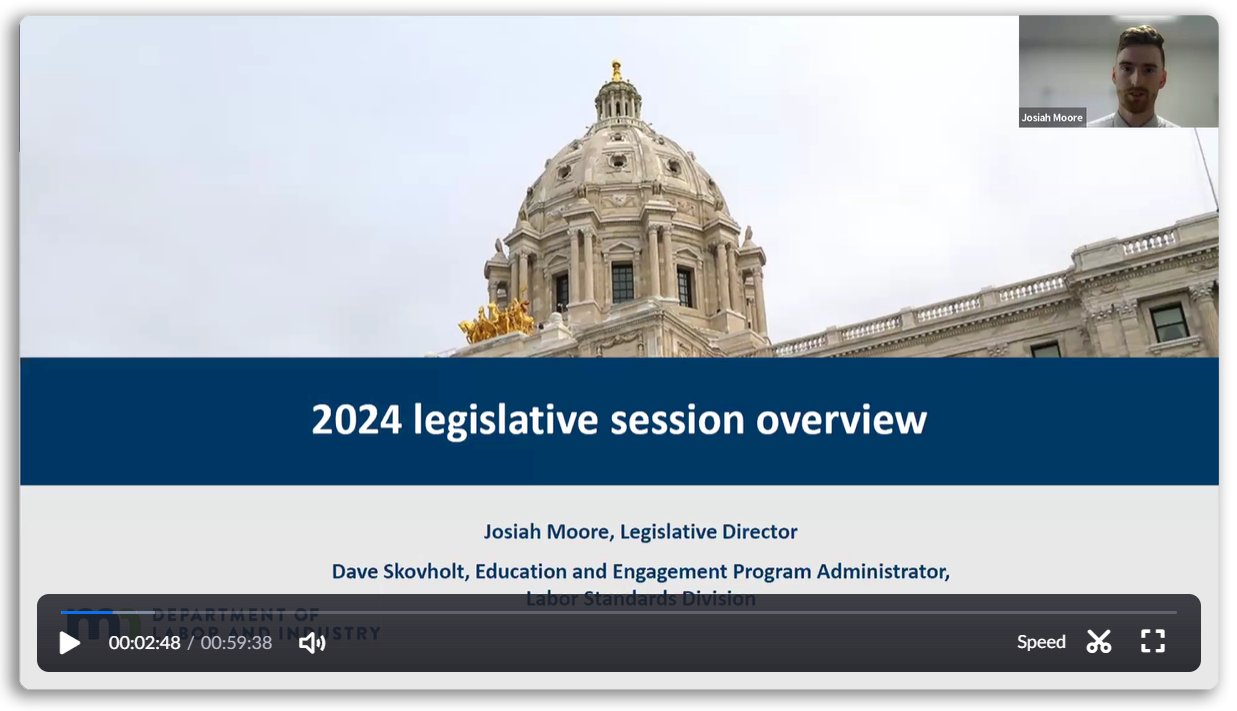
This on-demand webinar is for Minnesota Chamber members only. If you wish to become a member or have questions about membership in the Minnesota Chamber, click here.
2024: Understanding pay transparency
Attorney Mark Girouard of Nilan Johnson Lewis shares about changes in Pay Transparency. Mark specializes in Labor and Employment law and Business Litigation and is well experienced in state and federal issues surrounding pay and employment to help best inform employers.
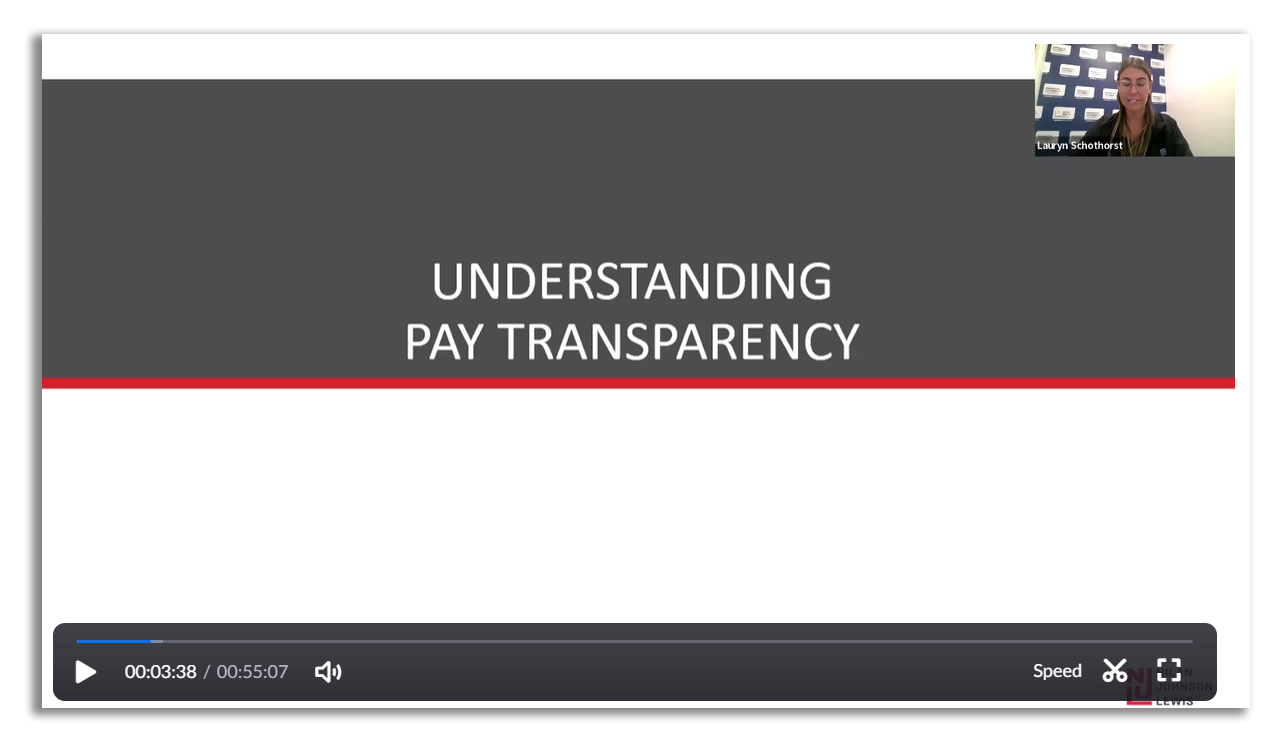
This on-demand webinar is for Minnesota Chamber members only. If you wish to become a member or have questions about membership in the Minnesota Chamber, click here.
2024: Understanding worker classification
Attorney Chelsea Bodin of Nilan Johnson Lewis shares about changes in worker classification. Chelsea specializes in Labor and Employment law and is well experienced in litigation and assisting employers with consultation on how to best comply ever-changing laws and regulations.
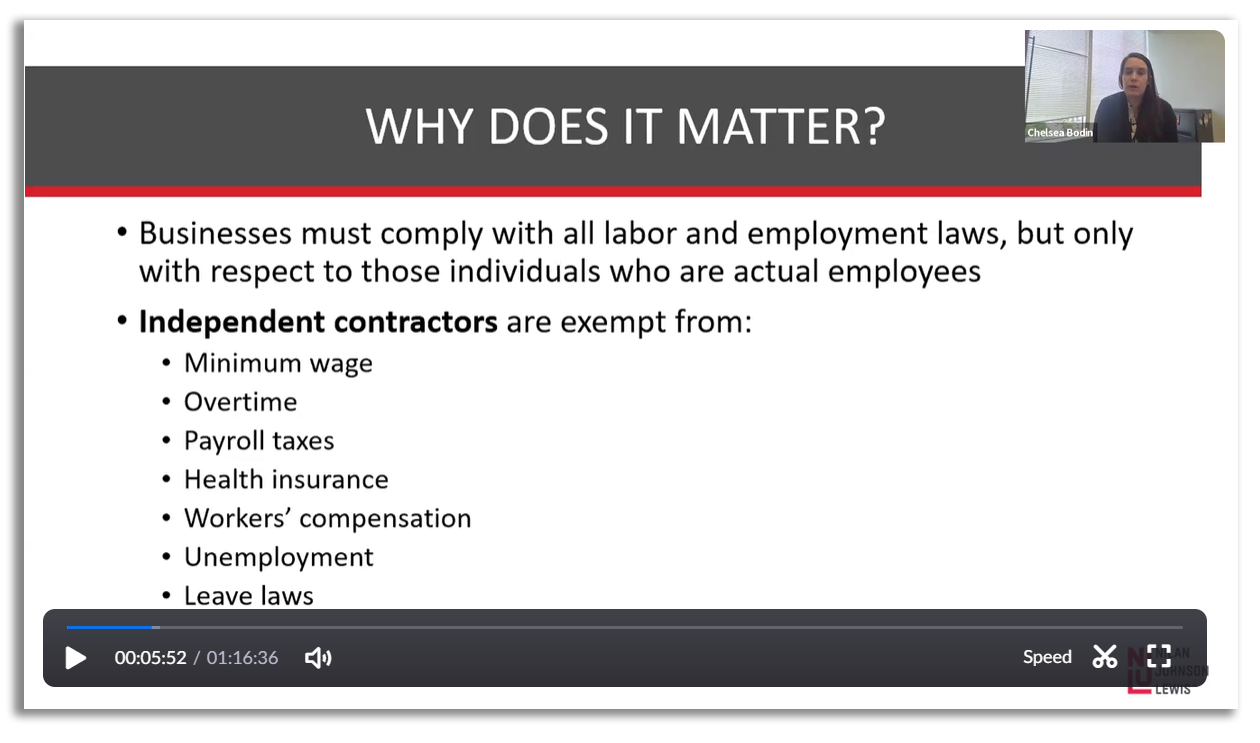
This on-demand webinar is for Minnesota Chamber members only. If you wish to become a member or have questions about membership in the Minnesota Chamber, click here.
WATCH: 2023 Statewide Policy Tour discussion on workplace and staffing regulations
2023: On-demand webinar: Overview of labor law changes
Featuring: Department of Labor and Industry Commissioner Nicole Blissenbach
After a busy Session that caused a host of new regulations, the Chamber recorded this webinar with Department of Labor and Industry Commissioner, Nicole Blissenbach. This session delves into the intricacies of the recent transformations in labor laws, discussing multiple new policies that are of vital importance to employers. Offering invaluable knowledge to help stay compliant, the Minnesota Chamber equips businesses with necessary information to adapt and thrive in a changing labor landscape.
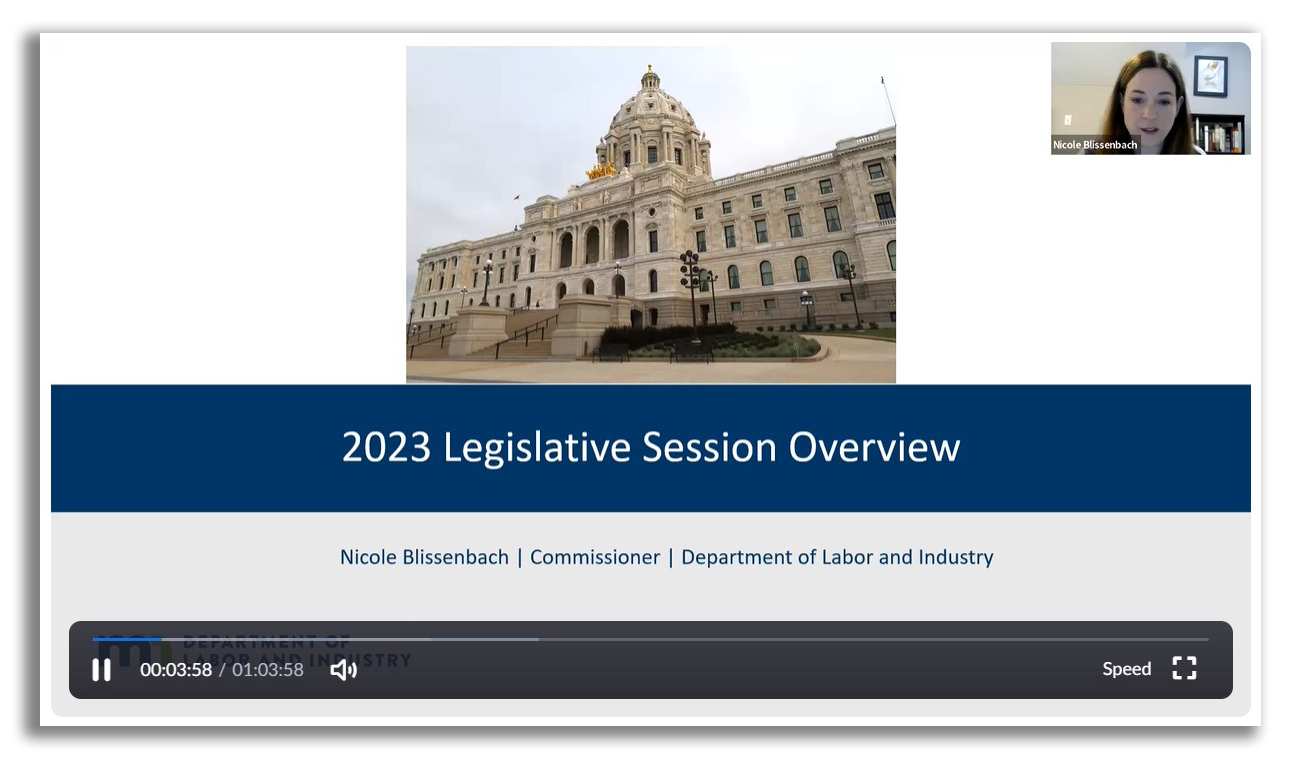
This on-demand webinar is for Minnesota Chamber members only. If you wish to become a member or have questions about membership in the Minnesota Chamber, click here.
2023: On-demand webinar: Pay history question ban
Featuring: Minnesota Department of Human Rights Commissioner Rebecca Lucero
During the last legislative session, the state legislature added new regulations surrounding the questions an employer can ask during hiring about pay history. This webinar is designed to help employers, HR professionals, hiring managers and other business executives understand how to comply with Minnesota's new pay history question ban taking effect on January 1, 2024. This content features Rebecca Lucero, Commissioner of the Minnesota Department of Human Rights.
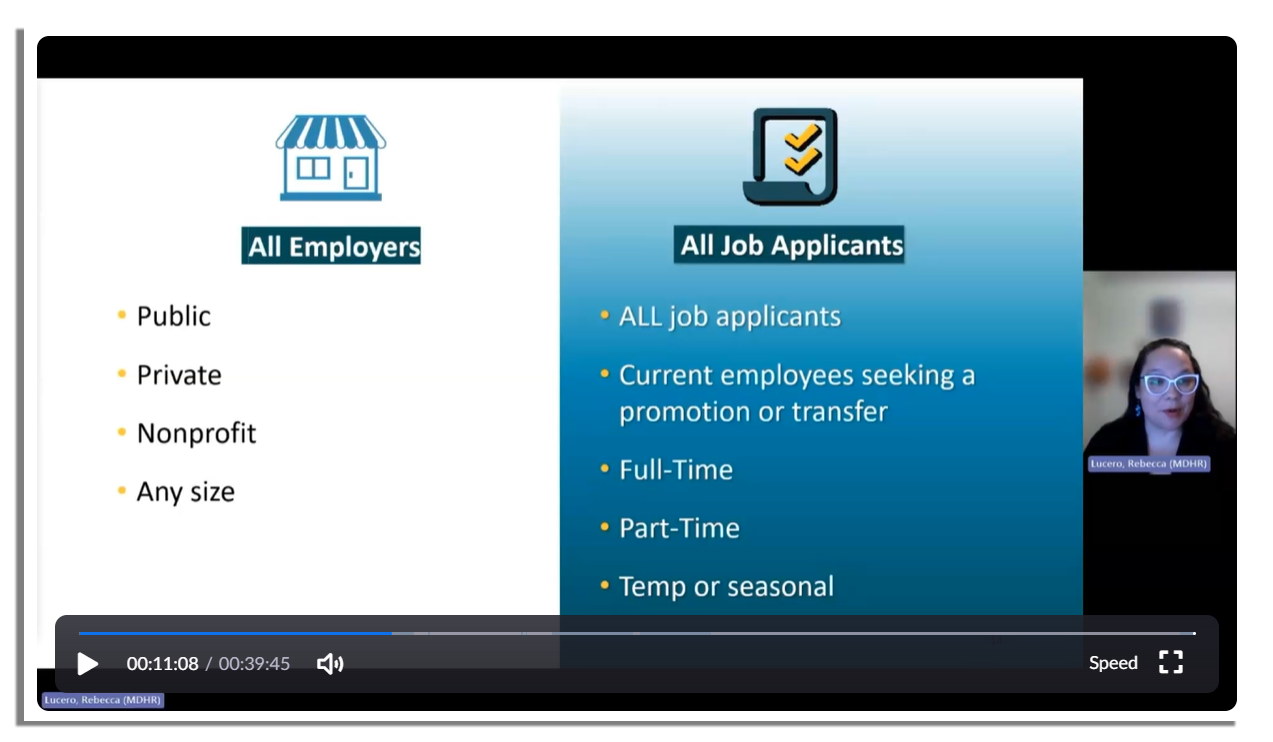
This on-demand webinar is for Minnesota Chamber members only. If you wish to become a member or have questions about membership in the Minnesota Chamber, click here.
Explore other issues
Interested in the Chamber's policy work?
Our goal remains to ensure that our state remains affordable to raise a family or start a successful business. The voice of business is important at the Capitol, to share real stories of how legislators’ decisions help or hurt Minnesota’s entrepreneurs. If you’re interested in helping us fight for all employers and employees across the state, find an opportunity that fits your interest.















